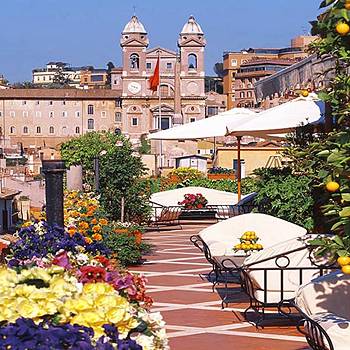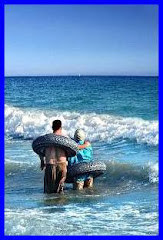
By Hoda Nassef
Taba! Beautiful pristine Taba, thank God, still unmarred by pollution. “Communication, communions, communities”… I lazily mumbled to myself, and felt intoxicated with the cool breeze lulling me. The view was breathtaking. Sitting on the sixth-floor balcony of the luxurious hotel, I could see the hills in the distance, on the other side of the Gulf of Aqaba across the Red Sea. The sapphire water sparked like iridescent sequined silk, changing its hues with the breeze.
I must have dozed off, for when I gazed again across the sea, night had fallen like a fluffy blanket of blue velvet. The hills on the other side were no longer clearly defined; instead, lights twinkled all along the shores. From where I still sat, I could see Eilat nearby to my left, Jordan across, in the center, and Saudi Arabia along a big stretch, to the right. I waved, to no on in particular, feeling a bit silly. No one could see me of course. Besides, it was then dark. Wouldn’t it be wonderful, I thought, as Man must have thought from the beginning of Time, if Earth had no boundaries? A world of no frontiers: One Big Community. That would be the ultimate nirvana. Or, would we all fight to live in the choice spots of the world? On second thought, that’s just what we are doing right now; no frontiers may be Hell, after all.
Next morning I walked along the beach, and noticed several seals emerging from the sea, flapping their shiny big fins over the pebbles and soft sand. Suddenly, one seal spoke Japanese, another English, a third gesticulated and punctuated his nods in Urdu and two other “seals” spoke in Italian and French simultaneously, while the sixth said something in German. The seventh seal, which seemed to be the leader, said “yalla beena”, and they all laughed. He was the Egyptian diving instructor.
Approaching them, I noticed that they all had one thing in common: their passion for diving. Next on the list was their love for Sinai’s incomparable reefs and pristine marine beauty. Added to that, was their love for a more casual lifestyle. Not surprisingly, many weekend tourists returned for longer vacations, and some have even made Egypt their permanent home. Most of the divers like to explore new diving venues, and go out of their way to discover new spots of pleasure, even if it meant taking a camel ride or jeep to unknown destinations. But, Taba was famous, particularly for its background rocky mountains, its landscape, its coral reefs and variety of species of fish in multi-colours, the transparent aquamarine water, and last but not least, the relevant diving sports.
I was intrigued to delve more into their lives and find out more about this diving passion, so I decided to chat with them for a while. After interviewing them, I discovered that many of the divers (Egyptians as well as foreigners) had changed their occupations, or even their whole lifestyle, in order to go diving. Also, many who began diving as a hobby, turned their hobby into a diving career, and have become diving instructors themselves. Surprisingly, all who left their former jobs, careers, and even homeland, admitted that they were financially better off before, but were much happier now. As one put it: “You really have to love diving in order to choose being a diving instructor as a career and lifestyle, and continue to dive all year round. The only problem is that there are already too many diving centers in Sinai, especially in Sharm El-Sheikh, so competition is fierce, and you really have to acquire a good reputation to establish a diving center, and keep the locals and tourists coming.”
I then approached another seasoned diver and wondered what she was doing in her “seal” outfit, with all that diving gear strapped around her. She was a British lady well past her prime, and her pretty face had turned into softly etched bronze leather. She told me her first visit to Egypt was in 1992. At the end of that same year, she ventured to dapple a bit in the water, and with the hotel’s diving instructor, she tried for the first time “snorkeling”, and the basics of diving, and discovered that she enjoyed it very much. The following year, she resigned from her well-paid job in England (where she worked as a “computer architectural designer”), and bade farewell to her family, friends, and country. She returned to Sharm El-Sheikh, and stayed for six months, learnt how to dive professionally, then became a diving instructor herself. She explained that becoming a diving instructor coincided with here newfound love of diving, the pristine shores, the sun, and the relaxed and friendly atmosphere. “You just did it for the pure joy of doing something you that you simply love to do,” she concluded. She’s been here ever since!
Another diver, a young Italian lady, told me that she came to Egypt a few years ago, as a casual “back-packer”, and fell in love with the turquoise transparent sea, landscape, and rocky hills. So, she decided to stay on for a bit when she found a job working at a beach resort in “animation” - (that’s what the recreation personnel are called, and they entertain the guests in sports and night performances). During her spare time, she used to go diving. Shortly afterwards, she switched to diving as a career, and is now a seasoned diver and part-time instructor in Sharm El-Sheikh.
Beside her, the Italian companion said that he first came to Egypt in 1994 while he was working for a travel agency, as a tour leader. He immediately left his job and has been diving professionally ever since. He started out in Hurghada as a “dive master”, then a “diving instructor”, and is now the “manager” of his own diving center. He said he began diving in Italy since he was a child. After college, he also dived in various parts of the world, depending on his where the travel agency took him. So, I asked him to compare the Red Sea to the other seas. Without hesitation, he said that he preferred the Red Sea because of its beautiful reefs, crystal-clear visibility, and warmer waters throughout the year. Ninety per cent of the diving clientele are foreigners, except during the Egyptian “eids” (feasts), he added, and said that the number of daily divers depend on the size of the diving centers, which usually accommodate or train from five to fifteen persons per session. In his opinion, Ras Mohamed is the best place for diving, followed by Sharm El-Sheikh, then Dahab and Nuweiba. Although he loves his life in Sharm El-Sheikh, he remarked that Sharm El-Sheikh is getting to be a bit too expensive, even for him! “But,” he admitted, “there are still lots of work opportunities for foreigners and foreign investment, due to the continuous influx of tourist developments that are flourishing and expanding everywhere, along the coastlines, and even throughout the remote areas across Sinai.”
I asked another diver what was his “most favourite thing” in diving. He said that in the ‘underwater world’, the thing he loves best, are the colours! He also loves to see the reefs, the variety of fish, especially the crown fish, and … believe it or not, the sharks! He isn’t really afraid of afraid of sharks, he said, and added that if you don’t stare at a shark face-to-face, and don’t move, they just go away. They attack only if they think you are planning to attack them. Sharks, he added, can be seen particularly in the months of July and August, near the shores of the protected park of Ras Mohamed and Tiran.
As for the pretty young lady nearby, I asked if she could add any more information, and what her future plans were. She laughed gaily, and said that apart from her love of the sand, sea, sun, and fun, she hoped to meet someone very rich, travel around the world, then return to Dahab and build her own beach resort there! With that retort, the conversation ended in laughter.
Without exception, all the divers said that the diving centers are like homes to them, and they all agreed they feel like one family, albeit their different nationalities, race and religion. Although most tourists come for vacations only, some of them take diving courses, and if they are good at it, they eventually earn diving certificates after the course, then become instructors themselves, and consequently stay on. Lots of new divers show up consistently during the summer. The permanent ones are those who remain throughout the winter, then throughout the year. Yet, they don’t have much time, or energy, for other hobbies, unless they are deep-sea underwater photographers as well. But, that’s another story!
The deep-sea life is a “world without frontiers”… However, you have to be a fish or a fossil – or a diver, to enjoy this unique utopia!
H.N.
























































































































